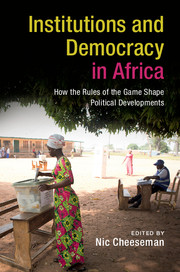Book contents
- Frontmatter
- Dedication
- Contents
- List of Figures
- List of Tables
- List of Contributors
- 1 Introduction: Understanding African Politics: Bringing the State Back In
- Part I Institutional Foundations
- Part II Law and Order
- 5 Constitutions: The Politics of Constitutional Reform
- 6 The Police: Laws, Prosecutions and Women's Rights in Liberia
- 7 The Bureaucracy: Policy Implementation and Reform
- Part III Elections, Parties and Political Competition
- Part IV Countervailing Institutions
- Index
- References
5 - Constitutions: The Politics of Constitutional Reform
from Part II - Law and Order
Published online by Cambridge University Press: 05 February 2018
- Frontmatter
- Dedication
- Contents
- List of Figures
- List of Tables
- List of Contributors
- 1 Introduction: Understanding African Politics: Bringing the State Back In
- Part I Institutional Foundations
- Part II Law and Order
- 5 Constitutions: The Politics of Constitutional Reform
- 6 The Police: Laws, Prosecutions and Women's Rights in Liberia
- 7 The Bureaucracy: Policy Implementation and Reform
- Part III Elections, Parties and Political Competition
- Part IV Countervailing Institutions
- Index
- References
Summary
It has been almost three decades since popular mobilisations, demanding better governance, drove the onset of democratisation in Africa. Although the consolidation of democracy – the building of democratic institutions and state capacity to manage the political and economic policies of society for development – remains a challenge, the number of current ‘democracies’ represents an improvement since the pre-1990s. A large majority of countries now conduct regular elections at national and local levels, enabling populations to choose their political leaders and ensuring the legitimacy of elected government officials. According to the 2015 Mo Ibrahim Index, democracy consolidation in Africa grew between 2000 and 2008, although it has stagnated since (Mo Index 2015).
Despite progress in the early 2000s, such stagnation indicates that the continent continues to be beset by a number of challenges. The first is the crisis of national identity that faces a number of states and is rooted in the formation of pluralistic states, characterised by differences in language, culture and religion among component groups. The challenge is how to manage this diversity and harness it for national development. The second is the worrying trend of leaders prolonging their power by amending constitutions, as has happened in Burundi, Rwanda and Uganda. The third is social exclusion, income inequality, and vulnerability to economic and environmental risks that face large segments of the populations. As Francis Deng has observed, often the state gets captured by a dominant group or groups that then define the national identity framework on their terms and give themselves the preeminent status as favoured citizens who enjoy all the rights and dignity of citizenship (2010). Other groups become discriminated against, marginalised, excluded and denied their full citizenship rights (see Klaas, Chapter 10, this volume).
Some of this can be explained by colonial rule, which subsumed distinct racial or ethnic groups under a unitary state framework, although many groups would have likely preferred nationhood (Rotberg 1965). All colonial systems were authoritarian and, therefore, all the new nations of Africa inherited a legacy of authoritarian political structures. The colonial rulers’ divide-and-rule strategy (in their political and economic policies) correlated diversity with disparities in the shaping and sharing of power, national wealth, social services and development opportunities.
- Type
- Chapter
- Information
- Institutions and Democracy in AfricaHow the Rules of the Game Shape Political Developments, pp. 117 - 136Publisher: Cambridge University PressPrint publication year: 2018
References
- 4
- Cited by

